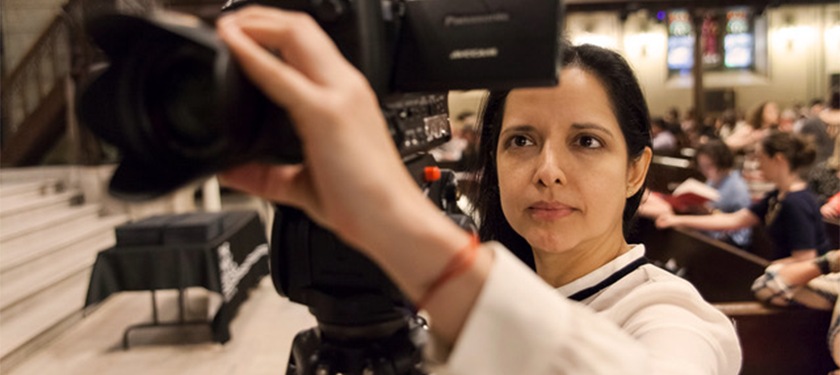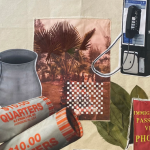Conversations | Luz Zamora
Filmmaker Luz Zamora talks about her career path from Caracas, Venezuela to New York City, and offers advice to those seeking to work with documentaries.
Artists working in film and new media operate at an intersection of creativity and technology that presents a unique set of obstacles to navigate. To garner insights on entering the film world, we spoke with documentary filmmaker Luz Zamora about her artistic career trajectory. Zamora is a 2019 recipient of the NYC Women’s Fund for Media, Music and Theatre, administered by NYFA.
NYFA: Some filmmakers work entirely alone, while others work with huge teams. How would you define the nature of your work and the way it is done?
Luz Zamora: Back in Venezuela, I used to be first Assistant Director (AD) for feature films. Back then, I enjoyed working with the huge crews. The location was a playground; the more complicated the day was, the more fun it was. A different kind of energy, of search. Now, I’m looking to interact with people and places, and if they resonate with me on a personal level, then I’ll approach them with the camera.
The camera and crew can be very distracting for life, and life can be very distracting for the camera as well. It takes focus and intention to be totally present with eyes and ears fully open when you are holding the camera. It is kind of a meditative state of mind. I used to practice Vipassana meditation, and now the camera and the editing room take me back to that feeling of a quiet mind and open heart. While life can be full of noise, when you grab the camera, everything is silent. Life goes in slow motion and in full color, and then you are dancing.
“What I love about doing documentaries is the possibility of entering other people’s universes. That proximity with your participants is fascinating because you both are discovering something new.”
NYFA: You moved from Venezuela to Los Angeles to collaborate on documentary features. What lessons have you learned, considering the other challenges that documentary filmmakers face? Can you speak to the opportunities and challenges of moving to a new place and continuing to make films?
LZ: What I love about doing documentaries is the possibility of entering other people’s universes. That proximity with your participants is fascinating because you both are discovering something new. That sparks my curiosity and keeps me going. Those interactions always change me, and that intimacy is only possible for me if I’m working in a solo run or with a minimalist team.
Moving away from Caracas was a forced move. Coming from a working family, it took a lot of work and tenacity to leave my hometown in Los Llanos to move to Caracas and graduate from one of the most prestigious universities in the country, la UCAB (Universidad Católica Andrés Bello). Then, I became the youngest and only woman Technical Director and Studio Director in Venezuela, then became a respected first AD in the film industry, and finally had my own boutique house production. I knew the moment I left the country, all of that was gone. But 10 years ago, it was evident the debacle that was coming to Venezuela. I left my comfort zone and began from scratch again in this country.
Once I was in Los Angeles, I was collaborating on documentaries and indie projects, but the house that I was living in burned down in a fire one night. It collapsed in a few minutes and everything was gone. That was a full reset. I lost all of my equipment and belongings.
Knowing that I didn’t have a place to go back, I put my mind in survival mode. If it doesn’t break you, it will make you stronger.
I’ve always said, if you want God to laugh, tell him your plans. Make plans, but prepare for everything. With nothing to lose, I continued my journey surviving between gigs, pilots, and student films, but that gave me the space to fortify my intention to work on documentaries on subject matters that I care about. Somos los que traemos: we are what we bring with us.
The road led to New York. I was accepted into a Documentary and Media Masters program with a merit scholarship. I had never in my life been in New York, and the scholarship only covered 50% of my tuition, so I had to figure out the rest. But when I landed in the city, it was love at first sight. The frenetic chaos of New York reminds me of Caracas, so I felt at home. With only a few hundred dollars in my pocket, two suitcases, and nothing to lose, I had a new beginning again.
On my first day in the city, after reading about a festival that was happening in the city, DOC NYC, I used half of my money to buy passes for some master classes there. I went to the IFC Center in Manhattan for the classes, and that was the first thing that I did in NYC. It was mind-blowing to see all those filmmakers there and spend several hours listening about the craft of filmmaking. Four years later, I premiered my first short film, De Colores, at the IFC Center during DOC NYC ’17. Full circle. Everything you experience will eventually show up in your work.
“I think that as a first-time filmmaker, your focus should be on the story that you want to tell. Then you make that happen using whatever you have available.”
NYFA: What advice would you offer to film artists seeking funding for their projects for the first time?
LZ: Apply to all possible sources of funding; expect none. Filmmaking is one thing, but to get funded is another craft. If you are a visual artist working in your second language, the heavy written components of the application plus all of the requirements could be discouraging.
I think that as a first-time filmmaker, your focus should be on the story that you want to tell. Then you make that happen using whatever you have available. My first short film, De Colores, was shot 80% on an iPhone because that was the resource that I had available. But it was an official selection in several film festivals around the country, and thanks to that I got seed funds from Fork Films and the NYC Women’s Fund for Media, Music and Theatre to do a second piece.
NYFA: The technology involved in filmmaking advances rapidly. How do you keep your skill set current, and react to—or anticipate—changes?
LZ: To keep current, always learning new tools, new software, and new techniques is key to mastering the craft. Without a big budget, knowledge could save you. As an independent filmmaker, you have to become self-taught and self-sufficient most of the time. You must become an eternal student. Constant learning is key to keep you moving forward. You have to keep curious, engaged, and hungry for knowledge.
About Luz Zamora:
Luz M. Zamora received a BA degree in Mass Communication with a specialization in audiovisual in her home country, Venezuela. She moved to Los Angeles to collaborate in documentary features, and subsequently to New York after being awarded a merit-based scholarship and admitted to The New School where she completed a Graduate Certificate in Documentary Studies and an MS in Digital Communications Media/Multimedia. Zamora was awarded an Honorable Mention in the Caracas Filminuto Film Festival in Venezuela with her short Caracas Fenced. Her next short De Colores premiered at DOC NYC in New York City, and it was part of the official selection of several film festivals in Los Angeles, Colorado, and New Orleans. As a filmmaker, Zamora has collaborated with prestigious organizations like The New School, Columbia University, New York Foundation for the Arts, Global Fund for Women, Women Peace and Security, and The United Nations.
– Interview conducted by Kyle Lopez, Program Associate
This post is part of the ConEdison Immigrant Artist Program Newsletter #140. Subscribe to this free monthly e-mail for artist’s features, opportunities, and events. Learn more about NYFA Immigrant Artist Mentoring Program.
The NYC Women’s Fund for Media, Music and Theatre is open for applications from July 26 to November 1. The application is available on Submittable.






